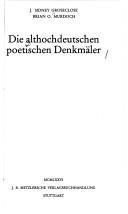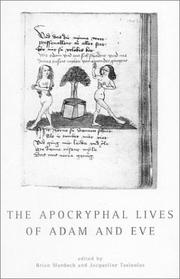| Listing 1 - 4 of 4 |
Sort by
|
Book
ISBN: 9780199596409 0199596409 0191745731 1283584220 0191626694 9786613896674 Year: 2012 Publisher: Oxford Oxford University Press
Abstract | Keywords | Export | Availability | Bookmark
 Loading...
Loading...Choose an application
- Reference Manager
- EndNote
- RefWorks (Direct export to RefWorks)
The story of the apocryphal pope and saint Gregorius was extremely popular throughout the middle ages and later in Europe and beyond. In a memorable narrative Gregorius is born from an incestuous relationship between a noble brother and sister, and is set out to sea with (unspecific) details of his origin. He is found and brought up by an abbot, but when revealed as a foundling leaves as a knight to seek his origins; he rescues his mother's land from attack, and marries her. On discovering his sin he undertakes years of penance on a rocky islet, which he survives miraculously. An angel sends emissaries from Rome to find him after the death of the pope, the key to his shackles is equally miraculously discovered, and he becomes pope. This hagiographical romance is not a variation upon Oedipus; it uses the invisible sin of incest as a parallel both for original sin (the sin of Adam and Eve) and for actual sin. It combines the universal theme of the quest for identity with the problem not of guilt as such, which is inevitable, but of how sinful humanity can cope with it. Brian Murdoch traces the story's probable origins in medieval England or France, and its later appearance in versions from Iceland and Ireland to Iraq and Egypt, in verse and prose, in full-scale literary forms or in much-reduced folktales, in theological as well as secular contexts, down to Thomas Mann and beyond.
Gregory I [Pope] --- Christian hagiography. --- Hagiographie chrétienne --- Gregory, --- Legends. --- Gregorius (Legendary character) --- Incest in literature --- Christian hagiography --- Hartmann, --- 235.3 "04/14" --- 235.3 GREGORIUS --- Hagiografie--Middeleeuwen --- Hagiografie--GREGORIUS --- Hagiographie chrétienne --- Gregorius peccator --- Hartmann, - von Aue, - active 12th century. - Gregorius

ISBN: 1571131035 1571132406 9781571132406 9781571136428 9781571131997 157113199X 9781571132475 1571132473 9781571132468 1571132465 9781571131744 1571131744 9781402073069 9781571136015 9781571132499 157113249X 9781571136619 9781571132505 1571132503 9781571136626 9786611770570 1281770574 1571136010 9786611770600 1281770604 1571136428 9786611770631 1281770639 1571136614 9786611770648 1281770647 1571136622 9781571136374 9781571136435 9781571136862 Year: 2004 Volume: 4 Publisher: Rochester Camden house
Abstract | Keywords | Export | Availability | Bookmark
 Loading...
Loading...Choose an application
- Reference Manager
- EndNote
- RefWorks (Direct export to RefWorks)
In Germany, Weimar Classicism (roughly the period from Goethe's return to Germany from Italy in 1788 to the death of his friend and collaborator Schiller in 1805) is widely regarded as an apogee of literary art. But outside of Germany, Goethe is considered a Romantic, and the notion of Weimar Classicism as a distinct period is viewed with skepticism. This volume of new essays regards the question of literary period as a red herring: Weimar Classicism is best understood as a project that involved the ambitious attempt not only to imagine but also to achieve a new quality of wholeness in human life and culture at a time when fragmentation, division, and alienation appeared to be the norm. By not succumbing to the myth of Weimar and its literary giants, but being willing to explore the phenomenon as a complex cultural system with a unique signature, this book provides an account of its shaping beliefs, preoccupations, motifs, and values. Contributions from leading German, British, and North American scholars open up multiple interdisciplinary perspectives on the period. Essays on the novel, poetry, drama, and theater are joined by accounts of politics, philosophy, visual culture, women writers, and science. The reader is introduced to the full panoply of cultural life in Weimar, its accomplishments as well as its excesses and follies. Emancipatory and doctrinaire by turns, the project of Weimar Classicism is best approached as a complex whole. Contributors: Dieter Borchmeyer, Charles Grair, Gail Hart, Thomas Saine, Jane Brown, Cyrus Hamlin, Roger Stephenson, Elisabeth Krimmer, Helmut Pfotenhauer, Benjamin Bennett, Astrida Orle Tantillo, W. Daniel Wilson. Simon J. Richter is associate professor of German at the University of Pennsylvania.
German literature --- History --- 830 <09> --- 830 <09> Duitse literatuur--Geschiedenis van ... --- Duitse literatuur--Geschiedenis van ... --- History and criticism --- Duitse literatuur--Geschiedenis van .. --- Enlightenment --- Influence --- Classicism --- Pseudo-classicism --- Aesthetics --- Literature --- Civilization, Classical --- Civilization, Germanic --- Germanic literature --- Germanic peoples --- Literature, Medieval --- Germanic tribes --- Ethnology --- Indo-Europeans --- Teutonic race --- Germanic civilization --- Teutonic civilization --- Civilization --- Young Germany --- Sturm und Drang movement --- Storm and stress --- History and criticism. --- Influence. --- anno 1300-1399 --- anno 1400-1499 --- anno 1500-1599 --- anno 1600-1699 --- Duitse literatuur--Geschiedenis van . --- Duitse literatuur--Geschiedenis van --- German literature - Middle High German, 1050-1500 - History and criticism. --- German literature - Early modern, 1500-1700 - History and criticism. --- Sturm und Drang movement. --- British literature. --- German literature. --- Goethe. --- North American literature. --- Romantic. --- Weimar Classicism. --- accomplishments. --- alienation. --- complex cultural system. --- cultural life. --- culture. --- division. --- drama. --- excesses. --- follies. --- fragmentation. --- human life. --- literary period. --- motifs. --- novel. --- philosophy. --- poetry. --- politics. --- preoccupations. --- science. --- shaping beliefs. --- theater. --- values. --- visual culture. --- women writers. --- Charms. --- Chronicles. --- Early Middle Ages. --- German Literature. --- Heroic Material. --- Hildebrandlied. --- Latin Influence. --- Literary Language. --- Ludwigslied. --- Manuscript Culture. --- Old High German Literature. --- Otfrid's Gospel-Poem. --- Prayers. --- Translations. --- Clayton Koelb. --- Drama. --- Eric Downing. --- Impressionism. --- Lyric Poetry. --- Music-Drama. --- Naturalism. --- Nineteenth-Century German Literature. --- Poetic Realism. --- Prose Fiction. --- Romanticism. --- Social and Political Context. --- Symbolism.

ISBN: 3476101401 9783476101402 Year: 1976 Volume: 140 Publisher: Stuttgart Metzler
Abstract | Keywords | Export | Availability | Bookmark
 Loading...
Loading...Choose an application
- Reference Manager
- EndNote
- RefWorks (Direct export to RefWorks)
German literature --- anno 500-1199 --- Civilization, Medieval, in literature --- History and criticism --- -Civilization, Medieval, in literature --- Civilization, Medieval, in literature. --- History and criticism. --- German literature - Old High German, 750-1050 - History and criticism --- ALTHOCHDEUTSCHE LITERATUR --- EINFÜHRUNG

ISBN: 9780859896986 0859896986 Year: 2002 Publisher: Exeter, UK: University of Exeter Press,
Abstract | Keywords | Export | Availability | Bookmark
 Loading...
Loading...Choose an application
- Reference Manager
- EndNote
- RefWorks (Direct export to RefWorks)
| Listing 1 - 4 of 4 |
Sort by
|

 Search
Search Feedback
Feedback About UniCat
About UniCat  Help
Help News
News